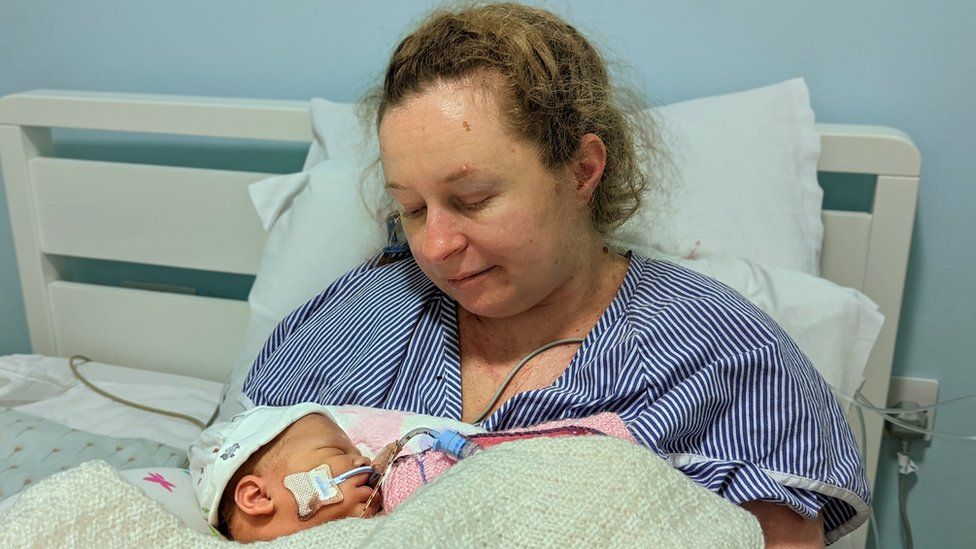1 hour ago
About sharing
Parents of a two-day-old girl who died in hospital after an emergency C-section are calling for a national inquiry into maternity services.
Abigail Fowler Miller died at Brighton’s Royal Sussex County Hospital (RSCH), in January last year.
An inquest last week found her life would have been prolonged if her mother had been admitted to hospital sooner.
University Hospitals Sussex NHS Foundation Trust said it had made “several improvements” since her death.
In October, families whose babies have died or been harmed in the care of the NHS called for a statutory public inquiry into England’s maternity services.
Robert Miller, Abigail’s father, told BBC Newsnight: “A national inquiry is the only way forward – we cannot continue to treat every incident as a separate tragedy.”
Distressed call
On 21 January 2022, Mr Miller and Katie Fowler contacted the hospital’s maternity assessment unit four times during the day.
Their first phone call was to inform the maternity assessment unit Ms Fowler was in labour, then to report bleeding, and finally to tell them she had become faint and short of breath.
According to the Health Safety Investigation Branch’s (HSIB) report, staff recorded that Ms Fowler sounded “distressed” in the fourth phone call to the unit, and she thought she was having a panic attack.
Staff said she could not answer questions in the fourth phone call because of her “distressed state” and she was asked to come into the hospital. Ms Fowler went into cardiac arrest on the journey in a taxi due to a uterine rupture.
The couple’s daughter, Abigail, was born via caesarean in a hospital reception.
Both Abigail and her mother needed resuscitating, and Ms Fowler was placed into an induced coma.
Abigail had no heartbeat and was not breathing, according to the HSIB’s report.
Ms Fowler was brought out of her coma to meet her daughter for the first time and to say goodbye to her, before Abigail died on 23 January.
‘Destroyed us’
Last week, an inquest found Abigail had severe hypoxic ischaemic encephalopathy, which resulted in multiple organ failure.
Concluding, Coroner Joanne Andrews said the policy of University Hospitals Sussex NHS Foundation Trust, which runs RSCH, required people to have an invitation to attend an assessment.
She concluded that if Ms Fowler had been offered an assessment, she would have been an in-patient and treated for the rupture – treatment she said could have “significantly prolonged Abigail’s life”.
Speaking to Newsnight, Ms Fowler said: “To lose our daughter has destroyed us and to know things should have been different is impossible to come to terms with.
“Abigail should still be with us. We miss her every single day, but it isn’t just about our loss. It’s also about hers, of the life she should have had.”
The HSIB report said Ms Fowler should have been invited into the hospital for an assessment following her third phone call to the maternity assessment unit.
It found the call document was “not completed fully” to allow staff to do a “dynamic risk assessment” of Ms Fowler when the couple called.
This resulted in staff not being alerted to the “changing clinical picture”, the investigation found.
The HSIB recommended guidance be put in place to support staff with making decisions on maternity telephone triage services.
A risk assessment tool should be available for the telephone triage service to identify mothers who immediately need an ambulance to get to hospital, the investigation also recommended.
‘Pattern of consistent failures’
Earlier this month, England’s healthcare regulator told BBC News that maternity units currently have the poorest safety ratings of any hospital service it inspects.
BBC analysis of Care Quality Commission (CQC) records showed it deemed two-thirds (67%) of them not to be safe enough, up from 55% last autumn.
The Brighton couple are now calling for a national inquiry into NHS maternity services. “
The need for change is urgent and long overdue, and our own traumatic experience has shown the results of ignoring these issues,” Mr Miller said.
“A national inquiry is the only way forward – we cannot continue to treat every incident as a separate tragedy.
“The government needs to look at the pattern of consistent failures across the UK and make real changes to maternity care to reverse the decline of this vital service.”
The couple said they have had to battle to get the answers for their daughter and called on NHS trusts to be willing to have open and honest conversations.
Emma Chambers, director of midwifery at University Hospitals Sussex NHS Foundation Trust, said it had made “several improvements” to how they triage mothers.
The maternity team “works incredibly hard” to provide the “best care” to all those using its services, she said.
“We want to do everything possible to keep them, and their babies safe, and to respond quickly to any early signs that may require a response,” she said.
“We have implemented a nationally-recommended triage process and monitor our performance constantly.”
The BBC has contacted NHS England and the Department of Health and Social Care for comment.
If you have been affected by any of the issues raised in this story you can visit BBC Action Line.
Related Topics
16 November 2022
31 October
